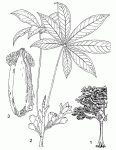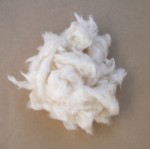By persada, on July 25th, 2010
Moch. Sahid, Marjani and Teger BasukiCeiba petandra, alley crop, yield, cassava, cash crop, Central Java
ABSTRACT
Increasing of kapok productivity gives positive impact to farmer’s income and foreign exchange. One of the efforts to increase kapok productivity is by genetic potential improvement. Beside increasing the productivity, farmer’s income could be increased by utilization of land under kapok trees . . . → Read More: Performance of Kapok Clones as Alley Crops With Cassava as Their Cash
By persada, on June 30th, 2010

Ceiba pentandra (L.) Gaertn.
Ceiba Pentandra
Protologue
Fruct. sem. pl. 2: 244 (1791)
Family
Bombacaceae (APG: Malvaceae)
Chromosome number
2n = 72–88
Synonyms
Eriodendron anfractuosum DC. (1824).
Vernacular names
Kapok tree, silk-cotton tree (En). Fromager, arbre à kapok, ouatier (Fr). Mafumeira, poilão, mufuma, árvore da sumaúma, kapoc (Po). Msufi (Sw).
Origin and geographic distribution
Ceiba pentandra originated in the American tropics. Its natural distribution has been obscured by . . . → Read More: Ceiba Pentandra
By persada, on June 30th, 2010
The fibre is light, very buoyant, resilient and resistant to water. The process of harvesting and separating the fibre is labour-intensive and manual. It is difficult to spin but is used as an alternative to down as filling in mattresses, pillows, upholstery, stuffed toys such as teddy bears, zafus and for insulation. It was previously much . . . → Read More: Use of Kapok Fiber
By persada, on June 23rd, 2010

kapok fiber
A natural vegetable fiber kapok (Ceiba Petandra), was evaluated for its feasibility as filter material for separating immiscible liquids such as oil/water mixtures. Two types of oils, namely diesel and hydraulic, were investigated. Various simulated oily waters were prepared by mixing tap water with one of these oils to produce binary oil/water mixtures of . . . → Read More: Kapok Fiber as Oil Absorbent

